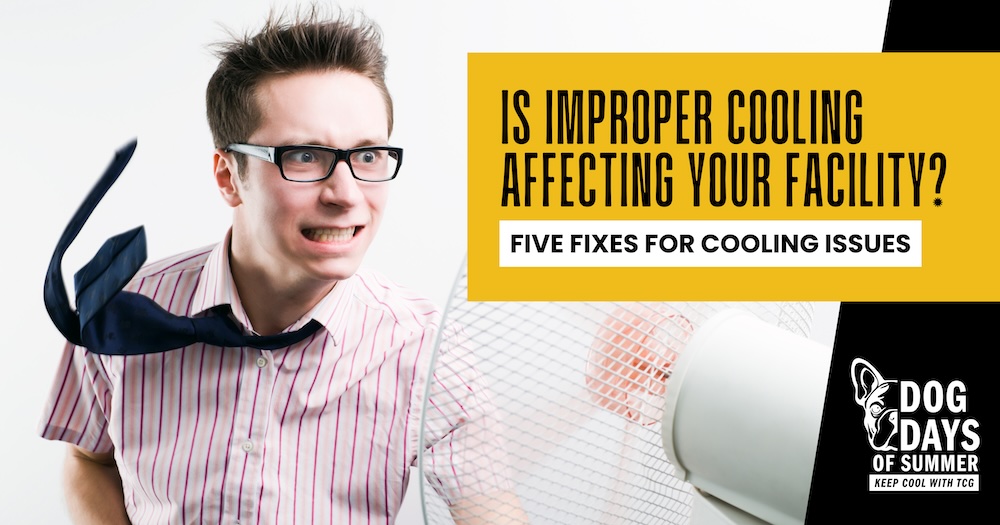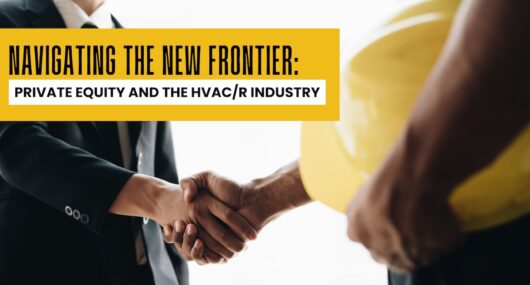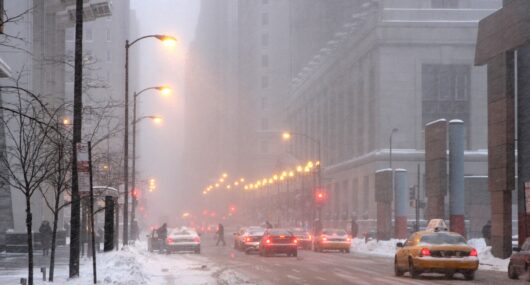
Tackling Improper Cooling in Commercial Facilities: Critical Factors and Practical Fixes
For the latest installment of our Dog Days of Summer series, we’re discussing improper cooling in commercial facilities. Maintaining proper cooling ensures a comfortable and productive environment. However, many facility managers face challenges with improper cooling in their locations, which can lead to discomfort, increased energy costs, and even equipment failure.
At Total Comfort Group (TCG), we understand these challenges and proactively work with our clients to address common causes of improper cooling through our preventative maintenance programs. Here are five common issues that result from improper colling and solutions to tackle them.
Common Causes of Improper Cooling
- Improper Air Balancing: Proper air balancing is crucial for efficient HVAC/R system operation. Air balancing involves adjusting the airflow within the HVAC/R system to ensure each facility area receives the right amount of conditioned air. When air is not balanced correctly, some areas may receive too much cooling while others receive too little – resulting in hot spots, cold spots, and overall discomfort for occupants.
- Solution: Schedule regular air balancing checks and adjustments to ensure an even distribution of conditioned air throughout the facility. Engaging professional HVAC/R technicians can help identify and correct any imbalances.
- Undersized Units: An undersized HVAC/R unit can struggle to cool a space effectively. When a unit is too small for the area, it needs to cool, and it runs continuously without achieving the desired temperature, leading to increased wear and tear and higher energy bills.
- Solution: Conduct a thorough load calculation before installing a new HVAC/R system. This involves assessing the size of the space, the number of occupants, insulation levels, and other factors that affect cooling needs. Selecting the appropriately sized unit ensures efficient cooling and energy usage. Struggling to find replacement RTUs? Read more about how Total Comfort Group is helping multi-site facility managers source equipment here.
- Lack of Weatherproofing at Entry Points: Poor weatherproofing at entry points, such as doors and windows, allows warm air to enter the facility, making it harder for the HVAC/R system to maintain a consistent temperature. This leads to overworking the system and increasing energy consumption.
- Solution: Inspect and seal gaps around doors, windows, and other entry points. Weatherstripping and caulking can prevent warm air from infiltrating the space and help maintain a stable indoor temperature.
- Poor Condition of the Unit: Regular maintenance is essential for keeping HVAC/R units in optimal condition. Units that are not properly maintained can suffer from various issues, such as refrigerant leaks, worn-out components and bad coils, and general wear and tear, all of which can compromise cooling performance.
- Solution: Work with a reputable facility management service provider to implement a preventative maintenance plan that includes regular inspections, cleaning, and servicing of HVAC/R units. Your facility management partner will help identify and address potential issues before they escalate, ensuring the system operates efficiently.
- Clogged Filters: Filters are critical in maintaining air quality and system efficiency. Clogged filters restrict airflow, causing the HVAC/R system to work harder to circulate air. This reduces cooling efficiency, increases energy consumption, and can lead to system damage over time.
- Solution: Replace filters regularly according to the manufacturer’s recommendations. More frequent filter changes may be necessary in high-traffic or dusty environments to ensure optimal performance.
The Total Comfort Group Approach
At Total Comfort Group (TCG), we specialize in providing comprehensive HVAC/R solutions tailored to the needs of multi-site facility managers. Our services are designed to address and prevent issues related to improper cooling, ensuring optimal performance and comfort. Here’s how we can help:
- Expert Assessments: Our experienced technicians conduct detailed assessments of your HVAC/R systems, identifying any cooling performance issues. We analyze airflow, unit sizing, weatherproofing, and overall system condition to provide a comprehensive evaluation.
- Customized Solutions: Based on our assessments, we develop customized solutions to address specific problems. Whether balancing airflow, upgrading to an appropriately sized unit, sealing entry points, or implementing a maintenance plan, we tailor our services to meet your facility’s unique needs.
- Preventative Maintenance: We offer preventative maintenance plans, including regular inspections, filter replacements, and system tune-ups. This proactive approach helps prevent issues before they occur, ensuring your HVAC/R systems operate efficiently year-round.
- Nationwide Coverage: As a self-performing provider of commercial HVAC/R, plumbing, and electrical services throughout 50 percent of the U.S. and professionally managing coverage nationwide, Total Comfort Group provides comprehensive services complemented by a local touch. Our technicians, 50 percent of whom are self-performing, are equipped to respond quickly to service requests, ensuring minimal downtime and maximum comfort for facilities.
- Energy Efficiency and Compliance: We stay up-to-date with the latest industry standards and regulations, ensuring our solutions improve cooling performance and enhance energy efficiency and compliance with environmental guidelines.
Conclusion
Improper cooling in commercial facilities can lead to discomfort, increased costs, and equipment failure. Multi-site facility managers can ensure efficient and effective cooling by partnering with a trusted facility management partner like TCG to address issues such as improper air balancing, undersized units, lack of weatherproofing, poor unit condition, and clogged filters.
Contact us today to discover how we can optimize your facility’s cooling performance with our customized HVAC/R solutions that enhance comfort, reduce costs, and ensure compliance with industry standards.



